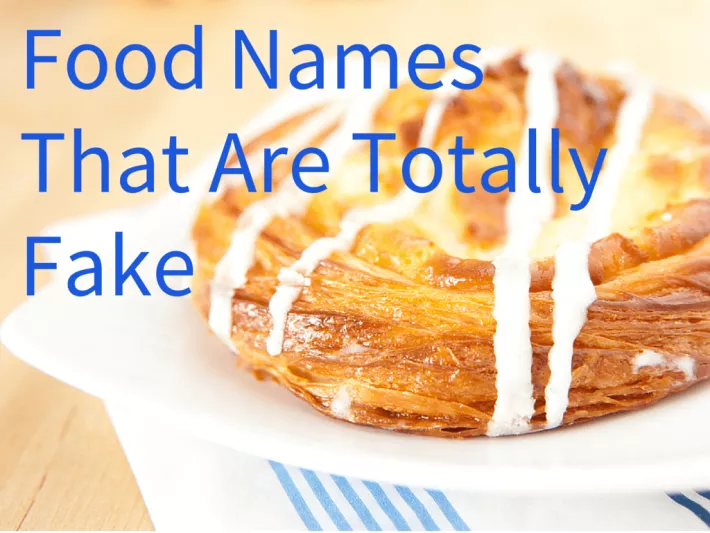One of our readers, Kris G., wrote that she loved our episode on German chocolate cake and how it isn’t really German. Now she’s wondering whether other foods with a regional name really come from that region. Let’s find out!
In short, it varies. Some food names are accurate: Brie cheese really comes from Brie, France. Other names are nonsensical. The Jerusalem artichoke is not from Jerusalem—nor is it an artichoke! It is edible, but it’s from North America, and its roots look more like potatoes than artichokes.
Here’s the scoop on a few other “regional” food names.
The Realists
First, there are the realists. These food names truly show where the food originated. For example
- • California rolls—an American version of sushi—really were invented in California.
- • Dijon mustard does hail from Dijon, France.
- • Lebanon bologna is a specialty of the Pennsylvania Dutch near Lebanon, Pennsylvania.
The Poseurs
Second, there are the poseurs. These food names bear little relation to their origin.
- • Danishes, for example, did not start in Denmark. In fact, they were first made in France about 350 years ago. An apprentice baker was making pastries and forgot to add the butter. When he saw his mistake, he folded lumps of butter into the already-mixed dough. He hoped no one would notice. What people did notice was the extra light dough that came from this “accidental” recipe. The new treat was carried to Italy, then Austria, then Denmark. Danish bakers then brought it to the rest of the world, along with their country name.
- • Don’t get us started on french fries. These everyday treats are not remotely French. Their name comes from the way they’re cut. Slicing food into long, thin strips is called frenching—as in, french fries or french-cut green beans. Why is the F in French often capitalized, even though it doesn’t represent the proper name of a country? Blame spell checkers! They mark lowercase french as a typo, regardless of context.
- • Swiss steak is another food with a fake name. This dish, smothered with onions and tomatoes, doesn’t exist in Switzerland. The name probably comes from an English term, swissing, which means smoothing out cloth between a set of rollers. Swiss steak is usually made from tough meat like beef round. To make it easier to chew, it’s pounded with a hammer or sliced by sharp rollers. In other words, it’s swissed.
The Accurate or Misleading
Third, there are foods whose names could be accurate or could be misleading. For example
- • Darjeeling tea. Technically, “Darjeeling tea” refers only to tea that’s grown and produced in Darjeeling, India; a hill town in the Himalayas. However, this tea isn’t native to Darjeeling. It was brought there from China in 1841 by an English civil servant. And he likely smuggled it in. So is this tea’s moniker a mistake? Hard to say.
- • Key lime pie. These tangy pies made with condensed milk were first whipped up in the Florida Keys in the 1850s. Bakers used juice from limes grown on the Keys. Today, however, almost all limes grown in America are Tahitian limes. Key lime pies are usually made with these. So should we still be calling this dessert Key lime pie? Maybe we should try Tahiti lime pie.
- • Veal parmigiana. This dish of breaded veal topped with tomato sauce is popular in Italian-American restaurants. The name likely comes from Parmesan cheese, a hard cheese originally made in Parma, Italy. However, there’s no dish like veal parmesan served in Parma. Even worse, veal parmesan is usually topped with mozzarella cheese. Maybe we should start calling this dish veal mozzarella.
In summary, some food names that include a region do come from that region. Others don’t.
Samantha Enslen runs Dragonfly Editorial. You can find her at click this link or on Twitter as @DragonflyEdit.
Sources
- Collins, Ross F. “A Tea Pilgrimage to Darjeeling.” North Dakota State University. click this link (accessed April 13, 2015).
- Herbst, Ron, and Sharon Tyler Herbst. The Cheese Lover’s Companion: The Ultimate A-to-Z Cheese Guide. William Morrow Cookbooks, 2007. click this link (accessed April 13, 2015).
- Herbst, Ron, and Sharon Tyler Herbst. The Deluxe Food Lover’s Companion, 2nd Ed. Barron’s Educational Series, 2015. click this link (accessed April 13, 2015).
- Ayto, John. The Diner’s Dictionary: Word Origins of Food. Oxford University Press, 2012. click this link (accessed April 13, 2015).
- Mariani, John F. “Danish Pastry: A Mistake That Conquered the World.” Los Angeles Times, September 19, 1993. click this link (accessed April 13, 2015).
- Mariani, John F. Encyclopedia of American Food and Drink. Bloomsbury USA, 2014. click this link (accessed April 13, 2015).
- Tea Board of India. Darjeeling Tea. click this link (accessed April 13, 2015).
Simple Fresh Danish Pastry on a Plate image courtesy of Shutterstock.





